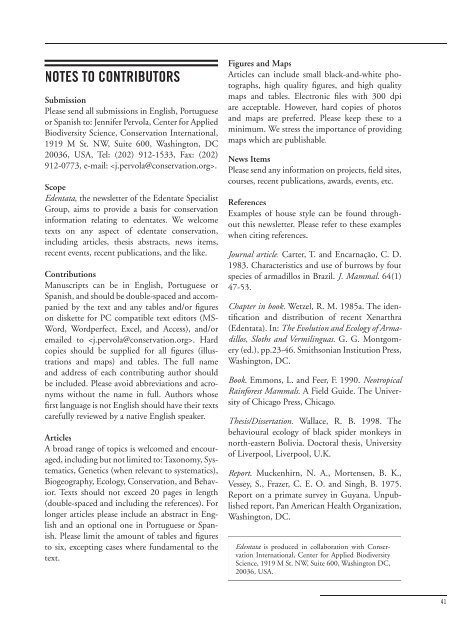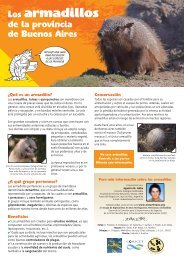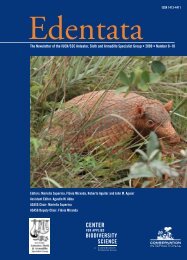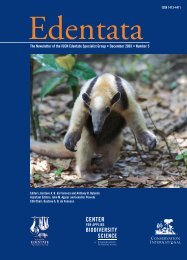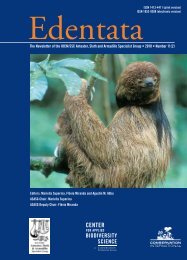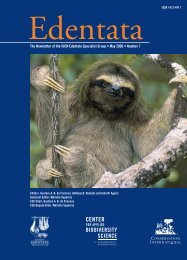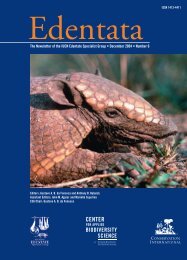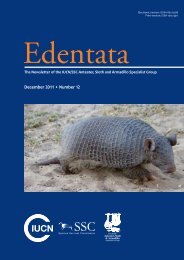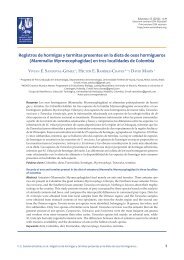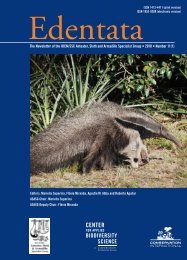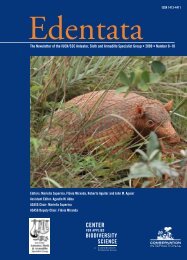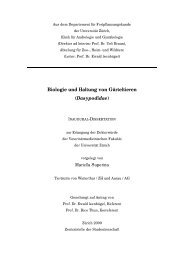Edentata 4 - Anteater, Sloth & Armadillo Specialist Group
Edentata 4 - Anteater, Sloth & Armadillo Specialist Group
Edentata 4 - Anteater, Sloth & Armadillo Specialist Group
You also want an ePaper? Increase the reach of your titles
YUMPU automatically turns print PDFs into web optimized ePapers that Google loves.
NOTES TO CONTRIBUTORS<br />
Submission<br />
Please send all submissions in English, Portuguese<br />
or Spanish to: Jennifer Pervola, Center for Applied<br />
Biodiversity Science, Conservation International,<br />
1919 M St. NW, Suite 600, Washington, DC<br />
20036, USA, Tel: (202) 912-1533, Fax: (202)<br />
912-0773, e-mail: .<br />
Scope<br />
<strong>Edentata</strong>, the newsletter of the Edentate <strong>Specialist</strong><br />
<strong>Group</strong>, aims to provide a basis for conservation<br />
information relating to edentates. We welcome<br />
texts on any aspect of edentate conservation,<br />
including articles, thesis abstracts, news items,<br />
recent events, recent publications, and the like.<br />
Contributions<br />
Manuscripts can be in English, Portuguese or<br />
Spanish, and should be double-spaced and accompanied<br />
by the text and any tables and/or figures<br />
on diskette for PC compatible text editors (MS-<br />
Word, Wordperfect, Excel, and Access), and/or<br />
emailed to . Hard<br />
copies should be supplied for all figures (illustrations<br />
and maps) and tables. The full name<br />
and address of each contributing author should<br />
be included. Please avoid abbreviations and acronyms<br />
without the name in full. Authors whose<br />
first language is not English should have their texts<br />
carefully reviewed by a native English speaker.<br />
Articles<br />
A broad range of topics is welcomed and encouraged,<br />
including but not limited to: Taxonomy, Systematics,<br />
Genetics (when relevant to systematics),<br />
Biogeography, Ecology, Conservation, and Behavior.<br />
Texts should not exceed 20 pages in length<br />
(double-spaced and including the references). For<br />
longer articles please include an abstract in English<br />
and an optional one in Portuguese or Spanish.<br />
Please limit the amount of tables and figures<br />
to six, excepting cases where fundamental to the<br />
text.<br />
Figures and Maps<br />
Articles can include small black-and-white photographs,<br />
high quality figures, and high quality<br />
maps and tables. Electronic files with 300 dpi<br />
are acceptable. However, hard copies of photos<br />
and maps are preferred. Please keep these to a<br />
minimum. We stress the importance of providing<br />
maps which are publishable.<br />
News Items<br />
Please send any information on projects, field sites,<br />
courses, recent publications, awards, events, etc.<br />
References<br />
Examples of house style can be found throughout<br />
this newsletter. Please refer to these examples<br />
when citing references.<br />
Journal article. Carter, T. and Encarnação, C. D.<br />
1983. Characteristics and use of burrows by four<br />
species of armadillos in Brazil. J. Mammal. 64(1)<br />
47-53.<br />
Chapter in book. Wetzel, R. M. 1985a. The identification<br />
and distribution of recent Xenarthra<br />
(<strong>Edentata</strong>). In: The Evolution and Ecology of <strong>Armadillo</strong>s,<br />
<strong>Sloth</strong>s and Vermilinguas. G. G. Montgomery<br />
(ed.), pp.23-46. Smithsonian Institution Press,<br />
Washington, DC.<br />
Book. Emmons, L. and Feer, F. 1990. Neotropical<br />
Rainforest Mammals. A Field Guide. The University<br />
of Chicago Press, Chicago.<br />
Thesis/Dissertation. Wallace, R. B. 1998. The<br />
behavioural ecology of black spider monkeys in<br />
north-eastern Bolivia. Doctoral thesis, University<br />
of Liverpool, Liverpool, U.K.<br />
Report. Muckenhirn, N. A., Mortensen, B. K.,<br />
Vessey, S., Frazer, C. E. O. and Singh, B. 1975.<br />
Report on a primate survey in Guyana. Unpublished<br />
report, Pan American Health Organization,<br />
Washington, DC.<br />
<strong>Edentata</strong> is produced in collaboration with Conser-<br />
vation International, Center for Applied Biodiversity<br />
Science, 1919 M St. NW, Suite 600, Washington DC,<br />
20036, USA.<br />
41


